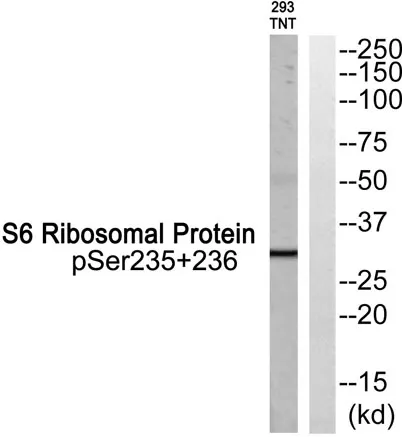Ribosomal Protein S6 (phospho Ser235/S236) rabbit pAb
CAT:
855-ES7077-01
Size:
50 μL
Price:
Ask
- Availability: 24/48H Stock Items & 2 to 6 Weeks non Stock Items.
- Dry Ice Shipment: No




Ribosomal Protein S6 (phospho Ser235/S236) rabbit pAb
- Description: Ribosomes, the organelles that catalyze protein synthesis, consist of a small 40S subunit and a large 60S subunit. Together these subunits are composed of 4 RNA species and approximately 80 structurally distinct proteins. This gene encodes a cytoplasmic ribosomal protein that is a component of the 40S subunit. The protein belongs to the S6E family of ribosomal proteins. It is the major substrate of protein kinases in the ribosome, with subsets of five C-terminal serine residues phosphorylated by different protein kinases. Phosphorylation is induced by a wide range of stimuli, including growth factors, tumor-promoting agents, and mitogens. Dephosphorylation occurs at growth arrest. The protein may contribute to the control of cell growth and proliferation through the selective translation of particular classes of mRNA. As is typical for genes encoding ribosomal proteins, there are multiple processed
- Synonyms: RPS6; OK/SW-cl.2; 40S ribosomal protein S6; Phosphoprotein NP33
- Gene ID: 6194
- UniProt: P62753
- Cellular Locus: Nucleus,nucleoplasm,nucleolus,cytoplasm,cytosol,ribosome,polysome,small ribosomal subunit,membrane,cytosolic small ribosomal subunit,dendrite,intracellular ribonucleoprotein complex,cytoplasmic ribonucleoprotein granu
- Host: Rabbit
- Species Reactivity: Human, Mouse, Rat
- Immunogen: The antiserum was produced against synthesized peptide derived from human S6 Ribosomal Protein around the phosphorylation site of Ser235 and Ser236. AA range:200-249
- Clonality: Polyclonal
- Validated Applications: WB, IHC, IF, ELISA
- Stability: 1 year
- Concentration: 1 mg/mL
- Dilution: Western Blot: 1/500 - 1/2000. Immunohistochemistry: 1/100 - 1/300. ELISA: 1/5000. Not yet tested in other applications.
- Molecular Weight: 30kD
- Storage Conditions: PBS with 0.02% sodium azide and 50% glycerol pH 7.4. Store at -20°C. Avoid repeated freeze-thaw cycles.
